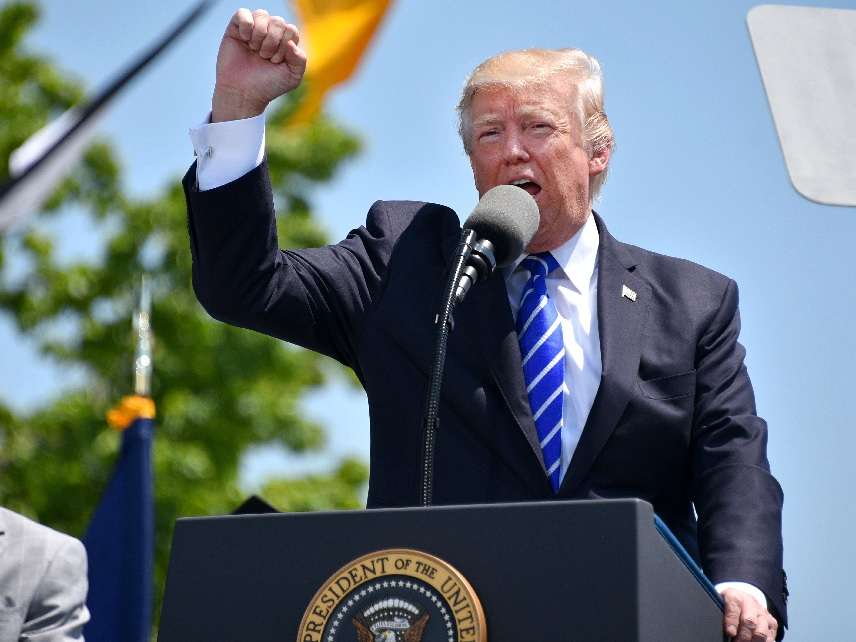Congress Wants to Make It Harder for Trump to Pursue Peace, Easy as Ever for Trump to Pursue War
Congress limiting president's power to loosen sanctions, but not to pursue military adventurism.

Congress is finally asserting its role in U.S. foreign policy. Unfortunately, it's not acting to curb a decade and a half of often aimless interventions around the world, let alone to curb the president's power to unilaterally commit the U.S. military to action, as President Donald Trump did when he bombed a Syrian government airfield, as he threatens to do with North Korea, and as President Barack Obama did in Libya in 2011.
Instead, Congress passed legislation to tighten sanctions against Russia, Iran, and North Korea, and to prevent the president from easing those sanctions on his own. It passed with a veto-proof majority, and the White House has signaled the president is likely to sign it.
That would make it harder for the president to defuse international tensions. But it remains easy for him to escalate tensions. Congress, after all, has showed no interest in reining in the White House's war-making powers. The House leadership just killed an effort by Rep. Barbara Lee (D-Calif.) to repeal the post-9/11 authorization for the use of military force, which has been used to provide legal justification for virtually every U.S. military endeavor since the Iraq War, the last conflict that got its own authorization.
The U.S. imposed sanctions on Moscow in 2014 in response to Russian aggression in Ukraine and Russia's annexation of Crimea. The sanctions did not end the fighting in Ukraine or return Crimea to Ukraine. They did not encourage dialogue between the U.S. and Russia or between Ukraine and Russia. They did help further deteriorate U.S.-Russia relations.
This new set of sanctions is aimed at "punishing" Russia for attempting to "influence" the American presidential election. That's not helpful for anything but domestic political rhetoric.
Combining sanctions against Russia, which still has normal diplomatic relations with the U.S., and sanctions against North Korea and Iran, so-called "rogue states" which do not have anything resembling normal diplomatic relations with the U.S., don't make them any more palatable. Instead, it's a troubling reminder that one of the easiest way to build a coalition in Washington is around warmongering.
Last year's presidential campaign was the third consecutive election where the nominee who advocated better relations with Russia won. Donald Trump ran for president in part on the idea that the U.S. was doing too much around the globe, and specifically rejecting Hillary Clinton's brand of anti-Russia saber-rattling. Perhaps surprisingly, he was able to win the Republican primary while explicitly rejecting the foreign policy doctrines of George W. Bush and Mitt Romney.
Trump's early actions in Syria and toward North Korea suggest he's since embraced the role of the U.S. as "world policeman" after all. Leading Democrats, meanwhile, have blamed Russia for Clinton's loss, leading them to embrace far more anti-Russian attitudes than in the Obama era.
While Romney was wrong to call Russia America's number one geopolitical foe, Obama too was wrong. Russia is not America's greatest geopolitical foe, and it does not even have to be a geopolitical foe at all. But it is a geopolitical power whose interests will not always align with the U.S.'s, and that's OK. In many of these instances, such as the row over Ukraine that led to the first round of sanctions, there are few compelling American interests for Russia to be at odds with to begin with. Ukraine is not a member of NATO and offers no strategic benefit to the United States. If anything, U.S. involvement in the region reduces the pressure on Ukraine—and on other regional powers, namely the European Union—from taking responsibility for resolving the crisis.
Some European countries, incidentally, are worried that new American sanctions could hurt them. Specifically, Germany and Austria worry that the sanctions could threaten Europe's energy supplies, which rely on Russia. American energy companies warned that an earlier version of the bill, which prohibited U.S. companies from participating in any project anywhere in the world where Russian companies were involved in any way, would make it easy for Russia to push U.S. companies out of the kind of energy projects that would actually make European countries less dependent on Russian energy. The new bill bans American companies only from ventures in which Russian companies have at least a 33 percent stake. That's still counterproductive, but at least it doesn't offer Russia a simple tool with which to limit American companies' ability to compete.


Show Comments (44)